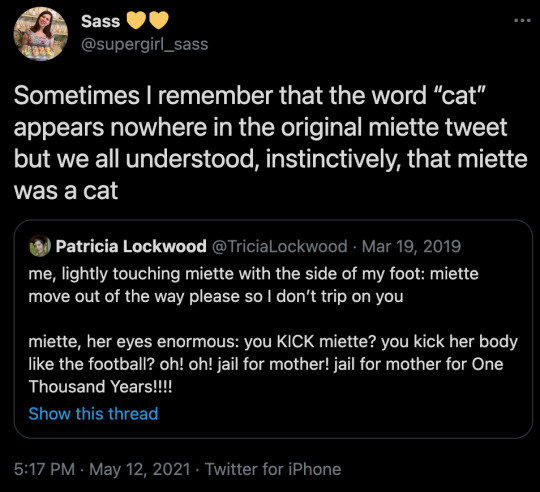clara | 20 | she/her | @red_and_frantic on ao3 (some of my old works at @lux_et_astra!) whatever my latest special interest is (currently dropout.tv)
Last active 2 hours ago
Don't wanna be here? Send us removal request.
Text
BABE WAKE UP ANDREW RANNELLS SINGING THE GAMES I PLAY IN 2025
154 notes
·
View notes
Text
in my opinion, many modern greek retellings/stories inspired by greek mythology don't fail because they're inaccurate. they fail because they have nothing new to say.
i don't mind changes to the original myths, as long as they make sense and they have a narrative purpose! i understand that making changes is sometimes necessary to convey a certain narrative, especially to modern audiences.
is epic the musical mythologically accurate? hell no! but the changes serve to tell a specific story and to convey a certain message. also, epic the musical is self aware about its "inaccuracies". and the music just bangs.
is hadestown accurate? no! does it make the change that I always dread, removing the kidnapping from the hades/persephone myth? yeah. but hadestown is barely about them, and it uses greek mythology as a "narrative frame" to tell a certain story. it has a point. it has a message.
what are stories like lore olympus trying to say? what is the messagge of the hundredth persephone/hades retelling? what are we supposed to take from them? "don't listen to your mother she's a bitch"? "mothers are irrational and you should forsake her for a man"? very feminist.
why are we still doing the medusa "feminist" retellings? it's BEEN done. too many times. and they're ALL the same. it's a worse crime than being bad: they are boring.
i'm tired of retellings that are just "what if this very famous story was THE OPPOSITE and the protagonist was an ASSHOLE the whole time and the villain was MISUNDERSTOOD and the real VICTIM" okay but why. why would that be the case. what's the point of the story you want to tell. or do you just want to use shock value.
of course, i dislike retellings that are so different from the myth that they go AGAINST the spirit/message of the original, because in that case what's even the point of retelling the myth? just tell an original story. but i would take stabbed poseidon and capitalist hades any day over the same basic story of medusa being a girlboss or demeter being bad because of... reasons?
tl;dr: stop being unoriginal and tell a good story. or at least an entertaining one. i beg you
3K notes
·
View notes
Text
i absolutely hate modern “romantic” retellings of Persephone’s story especially when they claim to be feminist. there is nothing feminist about looking at a story of a woman who is kidnapped and raped and whose mother moved heaven and earth to get her back and going “well, what if she wanted it? and what if her mother is actually kind of a bitch 🤔” please die
608 notes
·
View notes
Text
one thing I’ve realized is that the modern day has seriously screwed with the perception of Hades and Persephone. The whole myth was created to talk about a mother’s grief, most likely written to console mothers who had to give their daughters away for marriage. But the modern day has now made it a cutesy emo misunderstood guy x rebellious girl fighting against her strict mother, villainizing Demeter. And because this is all it’s known now, the moment someone brings up the original myth, they immediately get quieted or insulted.
1K notes
·
View notes
Text
So ! I need to say that !
Hades & Persephone's relationship is canonically a loving and quite healthy relationship in the context of Greek mythology which represents a form of balance for the world through the cycle of the seasons. Persephone is not a victim of Hades either... Anyone who has studied Greek mythology can actually explain it to you.
That's a bad vision of the original myth due to a too modern interpretation. It's not the modern era that romanticizes this basic relationship. This was already the case in Greek times...
It even seems to me that Hades and Persephone were often represented on the vases given to newlyweds (pretty crazy, since Hera was literally the goddess of marriage) because they were always described as having a loving, supportive and harmonious marriage.
And if you're looking for a real culprit in the union of Hades & Persephone, there's literally Zeus, who authorized the marriage between the two after Hades came to ask him. Hades didn't kidnap Persephone as soon as he saw her. He first asked to his father, Zeus, for her hand in marriage, as in the Greek traditions of the time.
In some versions of the myth, it even seems to me that Aphrodite is the one who provoked Hades' love for Persephone by sending Eros to plant an arrow in her after being upset by a refusal. But for now, I'm not sure of Aphrodite's real involvement.
But regardless, in the original myth, the one blamed is actually very clearly Zeus. He is the one, once again, having authorized the kidnapping of Persephone, which in Greek traditions translates into an engagement, and who has caused the whole messy situation with poor Demeter.
As for the grenade episode, it doesn't seem to me that we can know the original version. So the whole "Hades forced Persephone to eat the pomegranate" thing is also bullshit.
There doesn't even seem to me to be any indication of Persephone having been mistreated in any way by Hades in the myth. It's again bullshit.
I'm making this post because I've had yet another person explain to me that Persephone is a victim of Hades and that our modern age romanticizes the relationship between the two.
"Yes. Like Persephone gets bastardised. Persephone was Hades's assault victim. People try to "modernize" her by making her want Hades (all while making Demeter to be in the wrong). Mina was Dracula's assault victim. People try to "modernize" her by making her cheat on Jonathan for Dracula."
Except no. Persephone is not a victim of Hades in the context of Greek myth. That's a stinking modern vision. Kind of ironic, when you argue that it's the modern view that stands in for the real version of Persephone being a victim of Hades when... well no. It's the modern era that makes Persephone a victim of abuse at the hands of Hades, (this all reminds me of how people make Rhaenyra a victim of grooming in her relationship with Daemon) while that is not the case in the context of the original myth. As I explained above, this interpretation is modern bullshit. And it is very important to transcribe the myths in their ancient context to understand their various messages, otherwise you will miss the point.
But I won't elaborate further because @cthonisprincess has already explained it very well. I invite you to go and see these reblogs below which detail the whole affair of Hades and Persephone in much more detail :
I even recommend this video :
youtube
My god, I can't believe that in 2024, people are still at the stage of demonizing Hades, even though he is one of the rare decents gods, and still claiming that Persephone is an assault victim of Hades... This is a shameful distortion of the original myth and a real bastardization of the goddess Persephone.
Also... we're literally talking about a myth. The goal of a myth is to be reinvented according to the times. So what does it matter that there are adaptations of the myth that differ from the said myth, or rather from the biased vision that some have of making Persephone a poor victim of the evil Hades ?!

@aleksanderscult
374 notes
·
View notes
Text
The truth about Medusa and her rape... Mythology breakdown time!
With the recent release of the Percy Jackson television series, Tumblr is bursting with mythological posts, and the apparition of Medusa the Gorgon has been the object of numerous talks throughout this website… Including more and more spreading of misinformation, and more debates about what is the “true” version of Medusa’s backstory.
Already let us make that clear: the idea that Medusa was actually “blessed” or “gifted” by Athena her petrifying gaze/snake-hair curse is to my knowledge not at all part of the Antique world. I still do not know exactly where this comes from, but I am aware of no Greek or Roman texts that talked about this – so it seems definitively a modern invention. After all, the figure of Medusa and her entire myth has been taken part, reinterpreted and modified by numerous modern women, feminist activist, feminist movements or artists engaged in the topic of women’s life and social conditions – most notably Medusa becoming the “symbol of raped women’ wrath and fury”. It is an interesting reading and a fascinating update of the ancient texts, and it is a worthy take on its own time and context – but today we are not talking about the posterity, reinvention and continuity of Medusa as a myth and a symbol. I want to clarify some points about the ACTUAL myth or legend of Medusa – the original tale, as told by the Greeks and then by the Romans.
Most specifically the question: Was Medusa raped?
Step 1: Yes, but no.
The backstory of Medusa you will find very often today, ranging from mythology manuals (vulgarization manuals of course) to Youtube videos, goes as such: Medusa was a priestess of Athena who got raped by Poseidon while in Athena’s temple, and as a result of this, Athena punished Medusa by turning her into the monstrous Gorgon.
Some will go even further claiming Athena’s “curse” wasn’t a punishment but a “gift” or blessing – and again, I don’t know where this comes from and nobody seems to be able to give me any reliable source for that, so… Let’s put this out of there.
Now this backstory – famous and popular enough to get into Riodan’s book series for example – is partially true. There are some elements here very wrong – and by wrong I do mean wrong.
The story of Medusa being raped and turned into a monster due to being raped does indeed exist, and it is the most famous and widespread of all the Medusa stories, the one people remembered for the longest time and wrote and illustrated the most about. Hence why Medusa became in the 20th century this very important cultural symbol tied to rape and the abuse of women and victim-blaming. HOWEVER – the origin of this story is Ovid’s Metamorphoses, from the first century CE or so. Ovid? A Roman poet writing for Roman people. “Metamorphoses”? One of the two fundamental works of Roman literature and one of the two main texts of Roman mythology, alongside Virgil’s Aeneid. This is a purely Roman story belonging to the Roman culture – and not the Greek one. The story of Medusa’s rape does not have Greek precedents to my knowledge, Ovid introduced the element of rape – which is no surprise given Ovid turned half of the romances of Greek mythology into rapes. Note that, on top of all this, Ovid wasn’t even writing for religious purposes, nor was his text an actual mythological effort – he wrote it with pure literary intentions at heart. It is just a piece of poetry and literature taking inspiration from the legends of the Greek world, not some sort of sacred text.
Second big point: The legend I summarized above? It isn’t even the story Ovid wrote, since there are a lot of elements that do not come from Ovid’s retelling of the story (book fourth of the Metamorphoses). For example Ovid never said Medusa was a priestess of Athena – all he said was that she was raped in the temple of Athena. I shouldn’t even be writing Athena since again, this is a Roman text: we are speaking of Minerva here, and of Neptune, not of Athena or Poseidon. Similarly, Minerva’s curse did not involve the petrifying gaze – rather all Ovid wrote about was that Minerva turned Medusa’s hair into snakes, to “punish” her because her hair were very beautiful, and it was what made her have many suitors (none of which she wanted to marry apparently), and it is also implied it is what made Neptune fall in love (or rather fall in lust) with her. I guess it is from this detail that the reading of “Athena’s curse was a gift” comes from – even though this story also clearly does victim-blaming of rape here.
But what is very fascinating is that… we are not definitively sure Neptune raped Medusa in Ovid’s retelling. For sure, the terms used by Ovid in his fourth book of Metamorphoses are clear: this was an action of violating, sexually assaulting, of soiling and corrupting, we are talking about rape. But Ovid refers several other times to Medusa in his other books, sometimes adding details the fourth-book stories does not have (the sixth book for examples evokes how Neptune turned into a bird to seduce Medusa, which is completely absent from the fourth book’s retelling of Medusa’ curse). And in all those other mentions, the terms to designate the relationship between Medusa and Neptune are more ambiguous, evoking seduction and romance rather than physical or sexual assault. (It does not help that Ovid has an habit of constantly confusing consensual and non-consensual sex in his poems, meaning that a rape in one book can turn into a romance in another, or reversal)
But the latter fact makes more sense when you recall that the rape element was invented and added by Ovid. Before, yes Poseidon and Medusa loved each other, but it was a pure romance, or at least a consensual one-night. Heck, if we go back to the oldest records of the love between Poseidon and Medusa, back in Hesiod’s Theogony, we have descriptions of the two of them laying together in a beautiful, flowery meadow – a stereotypical scene of pastoral romances – with no mention of any brutality or violence of any sort. As a result, it makes sense the original “romantic” story would still “leak” or cast a shadow over Ovid’s reinvented and slightly-confused tale.
Step 2: So… no rape?
Well, if we go by Greek texts, no, apparently Medusa was not raped in Greek mythology, and only became a rape victim through Ovid.
The Ancient Greek texts all record Poseidon and Medusa sleeping with each other and having children, but no mention of rape. And the whole “curse of Athena” thing is not present in the oldest records – no temple of Athena soiling, no angry Athena cursing a poor girl… “No curse?” you say “But then how did Medusa got turned into a Gorgon”? Answer: she did not. She was born like that.
As I said before, the oldest record of Medusa’s romance but also of her family comes from Hesiod’s Theogony (Hesiod being one of the two “founding authors” of Greek mythology, alongside Homer – Homer did wrote several times about Medusa, but only as a disembodied head and as a monster already dead, so we don’t have any information about her life). And what do we learn? That Medusa is part of a set of three sisters known as the Gorgons – because oh yes, Ovid did not mention Medusa’s sister now did he? How did Medusa’s sisters ALSO got snake-hair or petrifying-gaze if only Medusa was cursed for sleeping with Neptune? Ovid does not give us any answer because again, it is an “adaptational plot hole”, and the people that try to adapt Ovid’s story have to deal with the slight problem of Stheno and Euryale needing to share their sister’s curse despite seemingly not being involved in the whole Neptune business. Anyway, back to the Greek text.
So, you have those three Gorgon sisters, and Medusa is said to be mortal while her sisters are not. Why is it such a big deal? Because Medusa wasn’t originally some random human or priestess. Oh no! Who were the Gorgons’ parents? Phorcys and Keto/Ceto, aka two sea-gods. Not just two sea-gods – two sea-gods of the ancient, primordial generation of sea-gods, the one that predated Poseidon, and that were cousins to the Titans, the sea-gods born of Gaia mating with Pontos.
So the Gorgons were “divine” of nature – and this is why Medusa being a mortal was considered to be a MASSIVE problem and handicap for her, an abnormal thing for the daughter of two deities. But let’s dig a bit further… Who were Phorcys and Ceto? Long story short: in Greek mythology, they were considered to be sea-equivalents of Typhon and Gaia. They were the parents of many monsters and many sea-horrors: Keto/Ceto herself had her name attributed and equated with any very large creature (like whales) or any terrifying monster (like dragons) from the sea. The Gorgons themselves was a trio of monsters, but their sisters, that directly act as their double in the myth of Perseus? The Graiai – the monstrous trio of old women sharing one eye and one tooth. Hesiod also drops the fact that Ladon (the dragon that guarded the golden apples of the Hesperids), and Echidna (the snake-woman that mated with Typhon and became known as the “mother of monsters”) were also children of Phorcys and Ceto, while other authors will add other monster-related characters such as Scylla (of Charybdis and Scylla fame), the sirens, or Thoosa (the mother of Polyphemus the cyclop). Medusa herself is technically a “mother of monsters” since she birthed both Pegasus the flying horse and Chrysaor, a giant. So here is something very important to get: Medusa, and the Gorgons, were part of a family of monsters. Couple that with the absence of any mention of curses in these ancient texts, and everything is clear.
Originally Medusa was not a woman cursed to become a monster: she was born a monster, part of a group of monster siblings, birthed by monster-creating deities, and she belonged to the world of the “primordial abominations from the sea”, and the pre-Olympian threats, the remnants of the primordial chaos. It is no surprise that the Gorgons were said to live at the edge of the very known world, in the last patch of land before the end of the universe – in the most inhuman, primitive and liminal area possible. They were full-on monsters!
Now you might ask why Poseidon would sleep with a horrible monster, especially when you recall that the Greeks loved to depict the Gorgons as truly bizarre and grotesque. It wasn’t just snake-hair and petrifying gaze: they had boar tusks, and metallic claws, and bloated eyes, and a long tongue that constantly hanged down their bearded chin, and very large heads – some very old depictions even show her with a female centaur body! In fact, the ancient texts imply that it wasn’t so much the Gorgon’s gaze or eyes that had the power to turn people into stone – but that rather the Gorgon was just so hideous and so terrifying to look at people froze in terror – and then literally turned into stone out of fear and disgust. We are talking Lovecraftian level of eldritch horror here. So why would Poseidon, an Olympian god, sleep with one of these horrors? Well… If you know your Poseidon it wouldn’t surprise you too much because Poseidon had a thing for monsters. As a sort of “dark double” of Zeus, whereas Zeus fell in love with beautiful princesses and noble queens and birthed great gods and brave heroes, Poseidon was more about getting freaky with all sorts of unusual and bizarre goddesses, and giving birth to bandits and monsters. A good chunk of the villains of Greek mythology were born out of Poseidon’s loins: Polyphemus, Antaios, Orion, Charybdis, the Aloads… And even his most benevolent offspring has freaky stuff about it – Proteus the shapeshifter or Triton half-man half-fish… So yes, Poseidon sleeping with an abominable Gorgon is not so much out of character.
Step 3: The missing link
Now that we established what Medusa started out as, and what she ended up as… We need to evoke the evolution from point Hesiod to point Ovid, because while people summarized the Medusa debate as “Sea-born monster VS raped and punished woman”, there is a third element needed to understand this whole situation…
Yes Ovid did invent the rape. But he did not invent the idea that Medusa had been cursed by Athena.
The “gorgoneion” – the visual and artistic motif of the Gorgon’s head – was, as I said, a grotesque and monstrous face used to invoke fright into the enemies or to repel any vile influence or wicked spirit by the principle of “What’s the best way to repel bad stuff? Badder stuff”. Your Gorgon was your gargoyle, with all the hideous traits I described before – represented in front (unlike all the other side-portraits of gods and heroes), with the face being very large and flat, a big tongue out of a tusked-mouth, snake-hair, bulging crazy eyes, sometimes a beard or scales… Pure monster. But then… from the fifth century BCE to the second century BCE we see a slow evolution of the “gorgoneion” in art. Slowly the grotesque elements disappear, and the Gorgon’s face becomes… a regular, human face. Even more: it even becomes a pretty woman’s face! But with snakes instead of hair. As such, the idea that Medusa was a gorgeous woman who just had snakes and cursed-eyes DOES come from Ancient Greece – and existed well before Ovid wrote his rape story.
But what was the reason behind this change?
Well, we have to look at the Roman era again. Ovid’s tale of Medusa being cursed for her rape at the hands of Neptune had to rival with another record collected by a Greek author Apollodorus, or Pseudo-Apollodorus, in his Bibliotheca. In this collection of Greek myths, Apollodorus writes that indeed, Medusa was cursed by Athena to have her beautiful hair that seduced everybody be turned into snakes… But it wasn’t because of any rape or forbidden romance, no. It was just because Medusa was a very vain woman who liked to brag about her beauty and hair – and had the foolish idea of saying her hair looked better than Athena’s. (If you recall tales such as Arachne’s or the Judgement of Paris, you will know that despite Athena being wise and clever, one of her main flaws is her vanity).
“Wait a minute,” you are going to tell me, “The Bibliotheca was created in the second century CE! Well after Greece became part of the Roman Empire, and after Ovid’s Metamorphoses became a huge success! It isn’t a true Greek myth, it is just Ovid’s tale being projected here…” And people did agree for a time… Until it was discovered, in the scholias placed around the texts of Apollonios of Rhodes, that an author of the fifth century BCE named Pherecyde HAD recorded in his time a version of Medusa’s legend where she had been cursed into becoming an ugly monster as punishment for her vanity. We apparently do not have the original text of Pherecyde, but the many scholias referring to this lost piece are very clear about this. This means that the story that Apollodorus recorded isn’t a “novelty”, but rather the latest record of an older tradition going back to the fifth century BCE… THE SAME CENTURY THAT THE GORGONEION STARTED LOSING THEIR GROTESQUE, and that the face of Medusa started becoming more human in art.
[EDIT: I also forgot to add that this evolution of Medusa is also proved by strange literary elements, such as Pindar's mention in a poem of his (around 490 BCE) of "fair-cheeked Medusa". A description which seems strange given how Medusa used to be depicted as the epitome of ugliness... But that makes sense if the "cursed beauty" version of the myth had been going around at the time!]
And thus it is all connected and explained. Ovid did invent the rape yes – but he did not invent the idea of Athena cursing Medusa. It pre-existed as the most “recent” and dominating legend in Ancient Greece, having overshadowed by Ovid’s time the oldest Hesiodic records of Medusa being born a monster. So what Ovid did wasn’t completely create a new story out of nowhere, but twist the Greek traditions of Athena cursing Medusa and Medusa having a relationship with Poseidon, so that the two legends would form one and same story. And this explains in retrospect why Ovid focuses so much on describing Medusa’s beautiful hair, and why Ovid’s Minerva would think turning her hair into snake would be a “punishment fit for the crime”: these are leftovers of the Greek tale where Medusa was punished for her boasting and her vanity.
CONCLUSION
Here is the simplified chronology of how Medusa’s evolution went.
A) Primitive Greek myths, Hesiodic tradition: Born a monster out of a family of sea-monsters and monstrous immortals. Is a grotesque, gargoylesque, eldritch abomination. Athena has only an indirect conflict with her, due to being Perseus’ “fairy godmother”. Has a lovely romance with Poseidon.
B) Slow evolution throughout Classical Greece and further: Medusa becomes a beautiful, human-looking girl that was cursed to have snake for hair and petrifying eyes, instead of being a Lovecraftian horror people could not gaze upon. Her conflict with Athena becomes direct, as it is Athena that cursed her due to being offended by her vain boasting. Her punishment is for her vanity and arrogant comparison to the goddess.
C) Ovid comes in: Medusa’s romance with Poseidon becomes a rape, and she is now punished for having been raped inside Athena’s temple.
[As a final note, I want to insist upon the fact that the story of Medusa being raped is not less "worthy" than any other version of the myth. Due to its enormous popularity, how it shaped the figure of Medusa throughout the centuries, and how it still survives today and echoes current-day problems, to try to deny the valid place of this story in the world of myths and legends would be foolish. HOWEVER it is important to place back things in their context, to recognize that it is not the ONLY tale of Medusa, that it was NOT part of Greek mythology, but rather of Roman legends - and let us all always remember this time Poseidon slept with a Lovecraftian horror because my guy is kinky.]
EDIT:
For illustration, I will place here visuals showing how the Ancient art evolved alongside Medusa's story.
Before the 5th century BCE: Medusa is a full-on monster



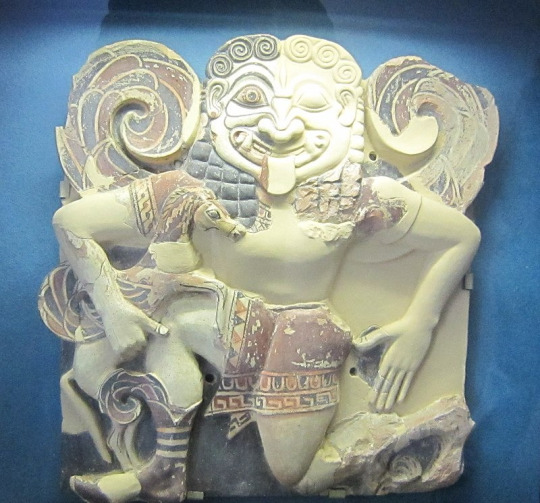


From the 5th century to the 2nd century BCE: A slow evolution as Medusa goes from a full-on monster to a human turned into a monster. As a result the two depictions of the grotesque and beautiful gorgoneion coexist.
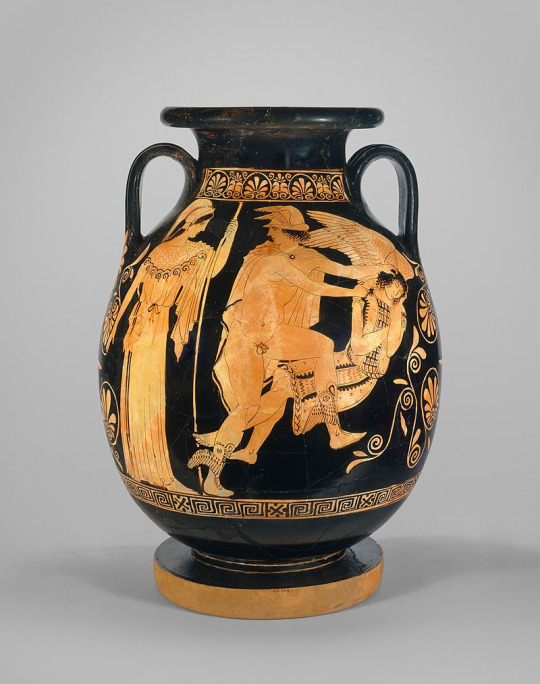


Post 2nd century BCE: Medusa is now a human with snake hair, and just that


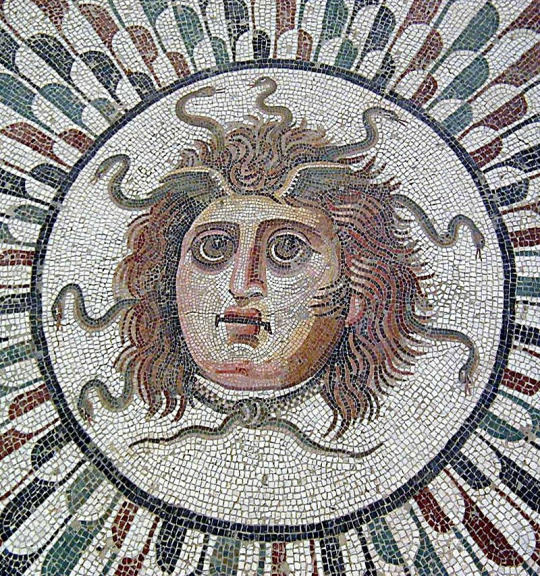
4K notes
·
View notes
Photo

Athena blessed her with the ability to protect herself and men beheaded her for it.
452K notes
·
View notes
Note
Persephone ate the pomegranate seeds willingly? Why?
I talk a lot about why she would eat the seeds willingly here and here. And there’s another bit I wrote about female agency in the Bronze Age here.
But the long and short of those three wordy essays on that idea is this: Persephone was a goddess and one who was deeply feared and respected by the Greeks. Before she became the Iron Queen of the Underworld, she presided over vegetation and fertility as the embodiment of spring (Karpophoros) and would have known what those seeds meant.
And by explicating the Homeric Hymn to Demeter, her first appearance in written record, we see that she changed Hades himself. The story begins with him snatching her unwillingly and carrying her away to the Underworld in the way a bride would traditionally be taken to her new husband’s home. But by the time Persephone leaves, he has this to say:
“Go now, Persephone, to your dark-robed mother, go, and feel kindly in your heart towards me: be not so exceedingly cast down; for I shall be no unfitting husband for you among the deathless gods, that am own brother to father Zeus. And while you are here, you shall rule all that lives and moves and shall have the greatest rights among the deathless gods: those who defraud you and do not appease your power with offerings, reverently performing rites and paying fit gifts, shall be punished for evermore.”
It is right after this scene that he slips her the pomegranate seeds. In this scene Hermes has come to bring Persephone back to grieving Demeter, and Hades doesn’t just say “here, Hermes I’ll return Zeus his property” but addresses and cajoles Persephone herself and offers her equal rulership over his domain something that would have been un-fucking-heard-of in a society where women were seen as chattel, as a way to simply produce sons.
But why did she eat the seeds? We know she didn’t do it because she was hungry. It says in the Illiad that gods do not require bread or wine as mankind does.
When she eats the seeds she is called “wise Persephone”, casting away doubt that it was done by mistake.
And she eats the seeds ONLY after Hades offers her timai, honor, and a chance to be something more than what she was in the world above: kore, a name that simply means ‘maiden’ or ‘girl’. If she hadn’t eaten the seeds, it would have compelled her to “remain continually with grave, dark-robed Demeter”, and she would have been a maiden without timai once more instead of the ruler over the dead that the Greeks feared and respected utterly.
Persephone herself says later that Zeus had given her to Hades with métis (wisdom), showing that she too was transformed by her time with Hades, and believed him to be a fitting husband. A good match for her. The alliteration of ‘dark-haired Hades and noble Persephone’ in how Hermes addressed them when he found them together would have also tipped off the ancient audience listening to the hymn that they were well matched.
Because she was a goddess of vegetation who would know the consequences of eating the food of the Underworld, because she held a place of such importance in the pantheon, and because she only did it after Hades promised her equal rule as Queen, I believe that Persephone ate the seeds conscientiously and willingly.
8K notes
·
View notes
Text
👏 Stop👏Romanticizing👏Persephone 👏And 👏 Hades 👏 Relationship 👏
#you're about to see me reblog a bunch of these so i can categorise them for my essay#i'll probably delete them after#thinking myth#i'm looking at the tumblrification of myth so i want to collect a bunch of posts romanticising myth#hades and persephone
20K notes
·
View notes
Text
I bought a game yesterday and it has consumed my life. I am not me anymore. I'm a weird plant expert who alphabetizes his stock.
4 notes
·
View notes
Text
idk if anyones been to bom on west end recently but i love how colin's elder mckinley points to elder price when saying
"being gay is bad"

and then to elder cunningham, "but lying is worse"

we obviously know that arnold is a compulsive liar...
so what does that tell us about kevin...
#book of mormon#musicals#elder price#elder mckinley#bom#elder cunningham#kevin price#arnold cunningham#connor mckinley#colin burnicle#i saw this on monday theyre so gay#theyre my baby boys and my best friends
358 notes
·
View notes
Text
*examining the venue* im just saying, if they ARE giants, i think theyll need to raise the mics a bit
6K notes
·
View notes
Text
everyone loves Predynastic Egyptian Terracotta Bowl with Human Feet. shout-out to a real one
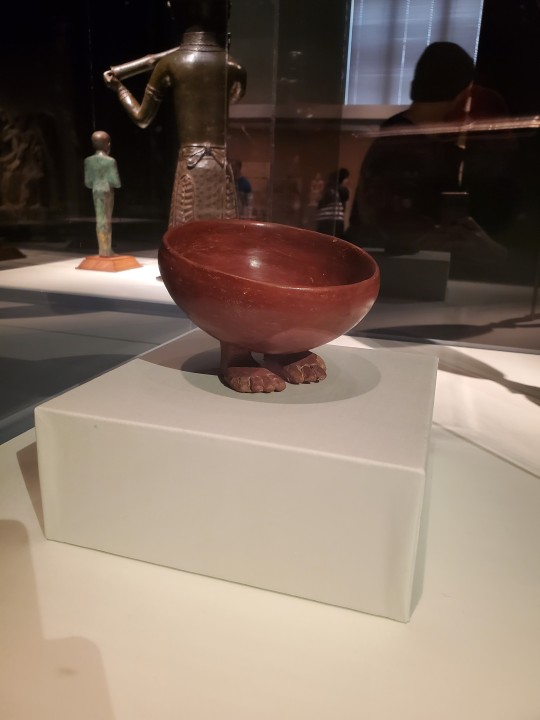
137K notes
·
View notes
Text
ok was anyone going to tell me there were lesbian trains in london 2024 starlight express or was i just supposed to find that out myself
#starlight express#london 2024 starlight express#stex london 2024#dinah the dining car#greaseball the diesel#train autism plus lesbianism equals
13 notes
·
View notes
